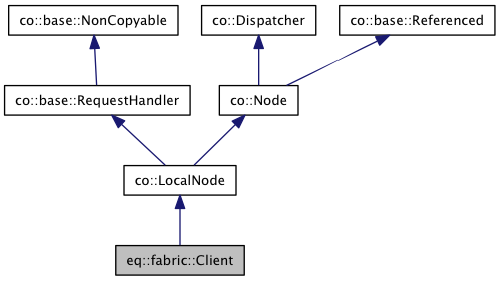A client represents a network node of the application in the cluster. More...
#include <client.h>
 Inheritance diagram for eq::fabric::Client:
Inheritance diagram for eq::fabric::Client: Collaboration diagram for eq::fabric::Client:
Collaboration diagram for eq::fabric::Client:Public Member Functions | |
| bool | connectServer (co::NodePtr server) |
| Open and connect an Equalizer server to the local client. | |
| bool | disconnectServer (co::NodePtr server) |
| Disconnect and close the connection to an Equalizer server. | |
| void | processCommand (const uint32_t timeout=EQ_TIMEOUT_INDEFINITE) |
| Get and process one pending command from the node command queue. | |
| virtual co::CommandQueue * | getMainThreadQueue ()=0 |
| virtual bool | dispatchCommand (co::Command &command) |
| Dispatches a packet to the registered command queue. | |
Protected Member Functions | |
| Client () | |
| Construct a new client. | |
| virtual | ~Client () |
| Destruct the client. | |
Detailed Description
A client represents a network node of the application in the cluster.
Definition at line 30 of file include/eq/fabric/client.h.
Member Function Documentation
| bool eq::fabric::Client::connectServer | ( | co::NodePtr | server | ) |
Open and connect an Equalizer server to the local client.
The client has to be in the listening state, see initLocal().
- Parameters:
-
server the server.
- Returns:
- true if the server was connected, false if not.
- Version:
- 1.0
| bool eq::fabric::Client::disconnectServer | ( | co::NodePtr | server | ) |
Disconnect and close the connection to an Equalizer server.
- Parameters:
-
server the server.
- Returns:
- true if the server was disconnected, false if not.
- Version:
- 1.0
| virtual bool eq::fabric::Client::dispatchCommand | ( | co::Command & | command | ) | [virtual] |
Dispatches a packet to the registered command queue.
- Parameters:
-
command the command.
- Returns:
- the result of the operation.
- See also:
- Command::invoke
Reimplemented from co::LocalNode.
| virtual co::CommandQueue* eq::fabric::Client::getMainThreadQueue | ( | ) | [pure virtual] |
- Returns:
- the command queue to the main node thread.
Implemented in eq::Client.
| void eq::fabric::Client::processCommand | ( | const uint32_t | timeout = EQ_TIMEOUT_INDEFINITE | ) |
Get and process one pending command from the node command queue.
- Version:
- 1.0
Referenced by eqPly::EqPly::run().
 Here is the caller graph for this function:
Here is the caller graph for this function:The documentation for this class was generated from the following file:



 1.2.1 by
1.2.1 by
 1.8.0
1.8.0